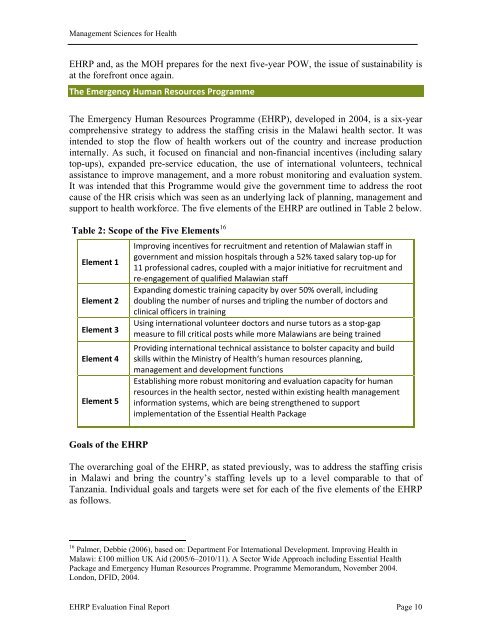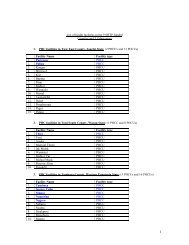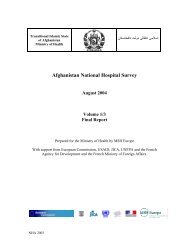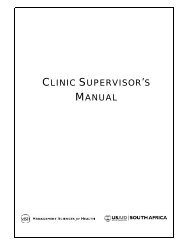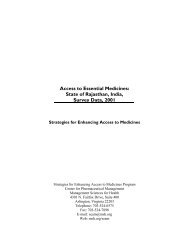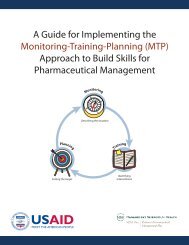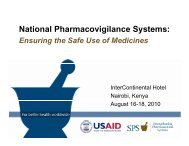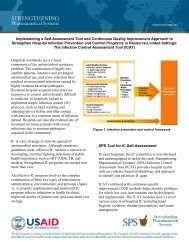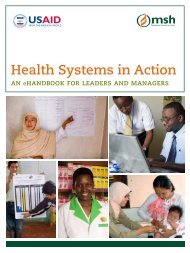Evaluation of Malawi's Emergency Human Resources Programme
Evaluation of Malawi's Emergency Human Resources Programme
Evaluation of Malawi's Emergency Human Resources Programme
Create successful ePaper yourself
Turn your PDF publications into a flip-book with our unique Google optimized e-Paper software.
Management Sciences for Health<br />
EHRP and, as the MOH prepares for the next five-year POW, the issue <strong>of</strong> sustainability is<br />
at the forefront once again.<br />
The <strong>Emergency</strong> <strong>Human</strong> <strong>Resources</strong> <strong>Programme</strong><br />
The <strong>Emergency</strong> <strong>Human</strong> <strong>Resources</strong> <strong>Programme</strong> (EHRP), developed in 2004, is a six-year<br />
comprehensive strategy to address the staffing crisis in the Malawi health sector. It was<br />
intended to stop the flow <strong>of</strong> health workers out <strong>of</strong> the country and increase production<br />
internally. As such, it focused on financial and non-financial incentives (including salary<br />
top-ups), expanded pre-service education, the use <strong>of</strong> international volunteers, technical<br />
assistance to improve management, and a more robust monitoring and evaluation system.<br />
It was intended that this <strong>Programme</strong> would give the government time to address the root<br />
cause <strong>of</strong> the HR crisis which was seen as an underlying lack <strong>of</strong> planning, management and<br />
support to health workforce. The five elements <strong>of</strong> the EHRP are outlined in Table 2 below.<br />
Table 2: Scope <strong>of</strong> the Five Elements 16<br />
Element 1<br />
Element 2<br />
Element 3<br />
Element 4<br />
Element 5<br />
Goals <strong>of</strong> the EHRP<br />
Improving incentives for recruitment and retention <strong>of</strong> Malawian staff in<br />
government and mission hospitals through a 52% taxed salary top‐up for<br />
11 pr<strong>of</strong>essional cadres, coupled with a major initiative for recruitment and<br />
re‐engagement <strong>of</strong> qualified Malawian staff<br />
Expanding domestic training capacity by over 50% overall, including<br />
doubling the number <strong>of</strong> nurses and tripling the number <strong>of</strong> doctors and<br />
clinical <strong>of</strong>ficers in training<br />
Using international volunteer doctors and nurse tutors as a stop‐gap<br />
measure to fill critical posts while more Malawians are being trained<br />
Providing international technical assistance to bolster capacity and build<br />
skills within the Ministry <strong>of</strong> Health‘s human resources planning,<br />
management and development functions<br />
Establishing more robust monitoring and evaluation capacity for human<br />
resources in the health sector, nested within existing health management<br />
information systems, which are being strengthened to support<br />
implementation <strong>of</strong> the Essential Health Package<br />
The overarching goal <strong>of</strong> the EHRP, as stated previously, was to address the staffing crisis<br />
in Malawi and bring the country’s staffing levels up to a level comparable to that <strong>of</strong><br />
Tanzania. Individual goals and targets were set for each <strong>of</strong> the five elements <strong>of</strong> the EHRP<br />
as follows.<br />
16 Palmer, Debbie (2006), based on: Department For International Development. Improving Health in<br />
Malawi: £100 million UK Aid (2005/6–2010/11). A Sector Wide Approach including Essential Health<br />
Package and <strong>Emergency</strong> <strong>Human</strong> <strong>Resources</strong> <strong>Programme</strong>. <strong>Programme</strong> Memorandum, November 2004.<br />
London, DFID, 2004.<br />
EHRP <strong>Evaluation</strong> Final Report Page 10


